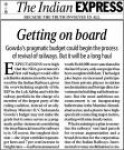Do we really need a railway budget?

You don’t say!
Darius Nakhoonwala
Budget time is when the pink papers come into their own because their edit writers can show off – quite a lot, when the editor permits them to – about how much they know about the railways. Problem is, they never know enough and, in any case, the small space available for edits forces them to do a hit-and-run job. So what the reader gets is a line on this, and a line on that.
But this time it was different. The Railway Budget for 2014-15 contained so little by way of specifics that the poor experts were forced to focus on the big picture. Result: the reader got a sense of what the overall strategy of the new government is going to be.
All edits lauded the decision to raise fares whenever fuel prices went up; all edits clucked at the decision to start the 50-odd new trains; all of them approved of the decision not to start new projects without completing existing ones; and most of them gave the new railway minister, DV Sadananda Gowda, a pat on the back for being a fine chap.
The Pioneer, which would have had the inside track on what to play up, saw absolutely nothing wrong with the Budget, and said “The big takeaway from the Railway Budget... is the massive role that the private sector and public-private partnerships will play in turning around the white elephant that Indian Railways has become. The roadmap will get sharper once the Cabinet stamps its approval to foreign direct investment in nearly all areas of railway functioning except train operations.”
On this topic, the pink papers were sceptical. The Economic Times merely said FDI and PPPs were ‘welcome’, as did Mint, which devoted just a line to the matter, and offered no real opinion on it.
The Hindu Business Line ignored it entirely.
The Business Standard, said “While many high-profile attempts to make the Railways more user-friendly have also been declared, a large number of them relies on public-private partnerships (PPPs). The degree to which such PPPs can be managed properly by a capacity-strained Railways organisation is questionable.” But it didn’t say why it thought so.
However, the Financial Express was less cavalier about this major policy shift. “Gowda has promised a lot more PPP including, for the first time, in the actual Railway operations. There is, as yet, no clarity on what projects are to be offered, and on what terms—that will determine whether there are any takers. Given the PM’s speech while inaugurating the Katra rail link in J&K last week, it is not surprising Gowda has talked of developing at least 10 major stations in metros along the lines of India’s new airports through PPP. This is heartening, though timelines would have been welcome. Several of Gowda’s predecessors have spoken of PPP, but there has been little action on this front. Given how the railway bureaucracy has successfully stalled PPP efforts for years, albeit under a different government, it would be advisable to hold the champagne till definite PPP projects are announced and awarded.”
The Indian Express said that it “comes across as a pragmatic policy statement considering the deep financial mess the railways is in...The budget pins hopes on increased participation from private players in station modernisation and foreign direct investment in building rail infrastructure.” The Times of India said that “Given that the expectation from PPP investment this year has increased by merely Rs 5 crore to Rs 6,005 crore, he clearly faces a challenge ahead.”
The Telegraph raised a cosmic question, albeit an old one. “No government or railway minister has raised the fundamental question: why should the government be involved in the running of the elaborate and complex railway network? Why should not the railways, in the spirit of economic reforms, be open to private capital and initiative?...This year’s rail budget is no different, save for the announcement that the bulk of future railway projects will be financed through public-private partnerships. This is just a glimmer of a change...The railway budget should be scrapped and be made part of the finance minister’s budget for the country.
The Hindu, like the Telegraph, said at the very outset that the budget “was full of ideas and policy formulations, but lacked concrete proposals or a vision or road map to take the Indian Railways forward...An open invitation to the corporate sector to invest in PPP projects will not by itself go very far without concrete proposals for land utilisation, or the development of major stations on the lines of airport terminals. The markets, which expected some major policy announcements, were obviously disappointed, and went south even as Mr. Gowda finished his budget speech.”
Such articles are only possible because of your support. Help the Hoot. The Hoot is an independent initiative of the Media Foundation and requires funds for independent media monitoring. Please support us. Every rupee helps.